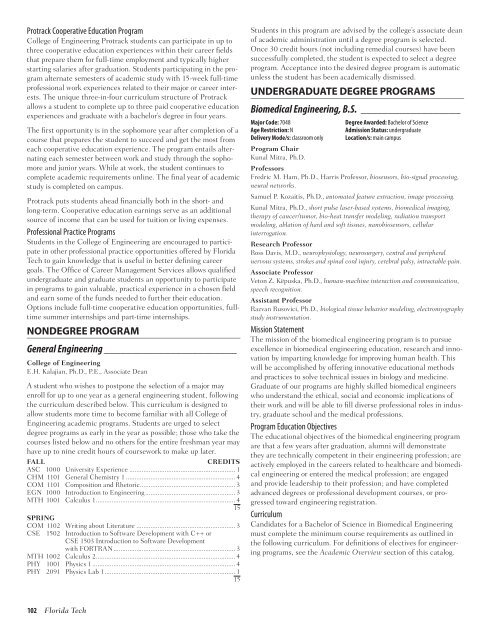2012–2013 UNIVERSITY CATALOG - Florida Institute of Technology
2012–2013 UNIVERSITY CATALOG - Florida Institute of Technology
2012–2013 UNIVERSITY CATALOG - Florida Institute of Technology
Create successful ePaper yourself
Turn your PDF publications into a flip-book with our unique Google optimized e-Paper software.
Protrack Cooperative Education Program<br />
College <strong>of</strong> Engineering Protrack students can participate in up to<br />
three cooperative education experiences within their career fields<br />
that prepare them for full-time employment and typically higher<br />
starting salaries after graduation. Students participating in the program<br />
alternate semesters <strong>of</strong> academic study with 15-week full-time<br />
pr<strong>of</strong>essional work experiences related to their major or career interests.<br />
The unique three-in-four curriculum structure <strong>of</strong> Protrack<br />
allows a student to complete up to three paid cooperative education<br />
experiences and graduate with a bachelor’s degree in four years.<br />
The first opportunity is in the sophomore year after completion <strong>of</strong> a<br />
course that prepares the student to succeed and get the most from<br />
each cooperative education experience. The program entails alternating<br />
each semester between work and study through the sophomore<br />
and junior years. While at work, the student continues to<br />
complete academic requirements online. The final year <strong>of</strong> academic<br />
study is completed on campus.<br />
Protrack puts students ahead financially both in the short- and<br />
long-term. Cooperative education earnings serve as an additional<br />
source <strong>of</strong> income that can be used for tuition or living expenses.<br />
Pr<strong>of</strong>essional Practice Programs<br />
Students in the College <strong>of</strong> Engineering are encouraged to participate<br />
in other pr<strong>of</strong>essional practice opportunities <strong>of</strong>fered by <strong>Florida</strong><br />
Tech to gain knowledge that is useful in better defining career<br />
goals. The Office <strong>of</strong> Career Management Services allows qualified<br />
undergraduate and graduate students an opportunity to participate<br />
in programs to gain valuable, practical experience in a chosen field<br />
and earn some <strong>of</strong> the funds needed to further their education.<br />
Options include full-time cooperative education opportunities, fulltime<br />
summer internships and part-time internships.<br />
NONDEGREE PROGRAM<br />
General Engineering ________________________<br />
College <strong>of</strong> Engineering<br />
E.H. Kalajian, Ph.D., P.E., Associate Dean<br />
A student who wishes to postpone the selection <strong>of</strong> a major may<br />
enroll for up to one year as a general engineering student, following<br />
the curriculum described below. This curriculum is designed to<br />
allow students more time to become familiar with all College <strong>of</strong><br />
Engineering academic programs. Students are urged to select<br />
degree programs as early in the year as possible; those who take the<br />
courses listed below and no others for the entire freshman year may<br />
have up to nine credit hours <strong>of</strong> coursework to make up later.<br />
FALL CREDITS<br />
ASC 1000 University Experience ............................................................ 1<br />
CHM 1101 General Chemistry 1 .............................................................. 4<br />
COM 1101 Composition and Rhetoric ...................................................... 3<br />
EGN 1000 Introduction to Engineering ................................................... 3<br />
MTH 1001 Calculus 1 ............................................................................... 4<br />
15<br />
SPRING<br />
COM 1102 Writing about Literature ........................................................ 3<br />
CSE 1502 Introduction to S<strong>of</strong>tware Development with C++ or<br />
CSE 1503 Introduction to S<strong>of</strong>tware Development<br />
with FORTRAN ..................................................................... 3<br />
MTH 1002 Calculus 2 ............................................................................... 4<br />
PHY 1001 Physics 1 ................................................................................. 4<br />
PHY 2091 Physics Lab 1 .......................................................................... 1<br />
15<br />
102 <strong>Florida</strong> Tech<br />
Students in this program are advised by the college’s associate dean<br />
<strong>of</strong> academic administration until a degree program is selected.<br />
Once 30 credit hours (not including remedial courses) have been<br />
successfully completed, the student is expected to select a degree<br />
program. Acceptance into the desired degree program is automatic<br />
unless the student has been academically dismissed.<br />
UNDERGRADUATE DEGREE PROGRAMS<br />
Biomedical Engineering, B.S. __________________<br />
major Code: 7048 Degree awarded: Bachelor <strong>of</strong> Science<br />
age restriction: N admission status: undergraduate<br />
Delivery mode/s: classroom only Location/s: main campus<br />
Program Chair<br />
Kunal Mitra, Ph.D.<br />
Pr<strong>of</strong>essors<br />
Fredric M. Ham, Ph.D., Harris Pr<strong>of</strong>essor, biosensors, bio-signal processing,<br />
neural networks.<br />
Samuel P. Kozaitis, Ph.D., automated feature extraction, image processing.<br />
Kunal Mitra, Ph.D., short pulse laser-based systems, biomedical imaging,<br />
therapy <strong>of</strong> cancer/tumor, bio-heat transfer modeling, radiation transport<br />
modeling, ablation <strong>of</strong> hard and s<strong>of</strong>t tissues, nanobiosensors, cellular<br />
interrogation.<br />
Research Pr<strong>of</strong>essor<br />
Ross Davis, M.D., neurophysiology, neurosurgery, central and peripheral<br />
nervous systems, strokes and spinal cord injury, cerebral palsy, intractable pain.<br />
Associate Pr<strong>of</strong>essor<br />
Veton Z. Këpuska, Ph.D., human-machine interaction and communication,<br />
speech recognition.<br />
Assistant Pr<strong>of</strong>essor<br />
Razvan Rusovici, Ph.D., biological tissue behavior modeling, electromyography<br />
study instrumentation.<br />
Mission Statement<br />
The mission <strong>of</strong> the biomedical engineering program is to pursue<br />
excellence in biomedical engineering education, research and innovation<br />
by imparting knowledge for improving human health. This<br />
will be accomplished by <strong>of</strong>fering innovative educational methods<br />
and practices to solve technical issues in biology and medicine.<br />
Graduate <strong>of</strong> our programs are highly skilled biomedical engineers<br />
who understand the ethical, social and economic implications <strong>of</strong><br />
their work and will be able to fill diverse pr<strong>of</strong>essional roles in industry,<br />
graduate school and the medical pr<strong>of</strong>essions.<br />
Program Education Objectives<br />
The educational objectives <strong>of</strong> the biomedical engineering program<br />
are that a few years after graduation, alumni will demonstrate<br />
they are technically competent in their engineering pr<strong>of</strong>ession; are<br />
actively employed in the careers related to healthcare and biomedical<br />
engineering or entered the medical pr<strong>of</strong>ession; are engaged<br />
and provide leadership to their pr<strong>of</strong>ession; and have completed<br />
advanced degrees or pr<strong>of</strong>essional development courses, or progressed<br />
toward engineering registration.<br />
Curriculum<br />
Candidates for a Bachelor <strong>of</strong> Science in Biomedical Engineering<br />
must complete the minimum course requirements as outlined in<br />
the following curriculum. For definitions <strong>of</strong> electives for engineering<br />
programs, see the Academic Overview section <strong>of</strong> this catalog.

















